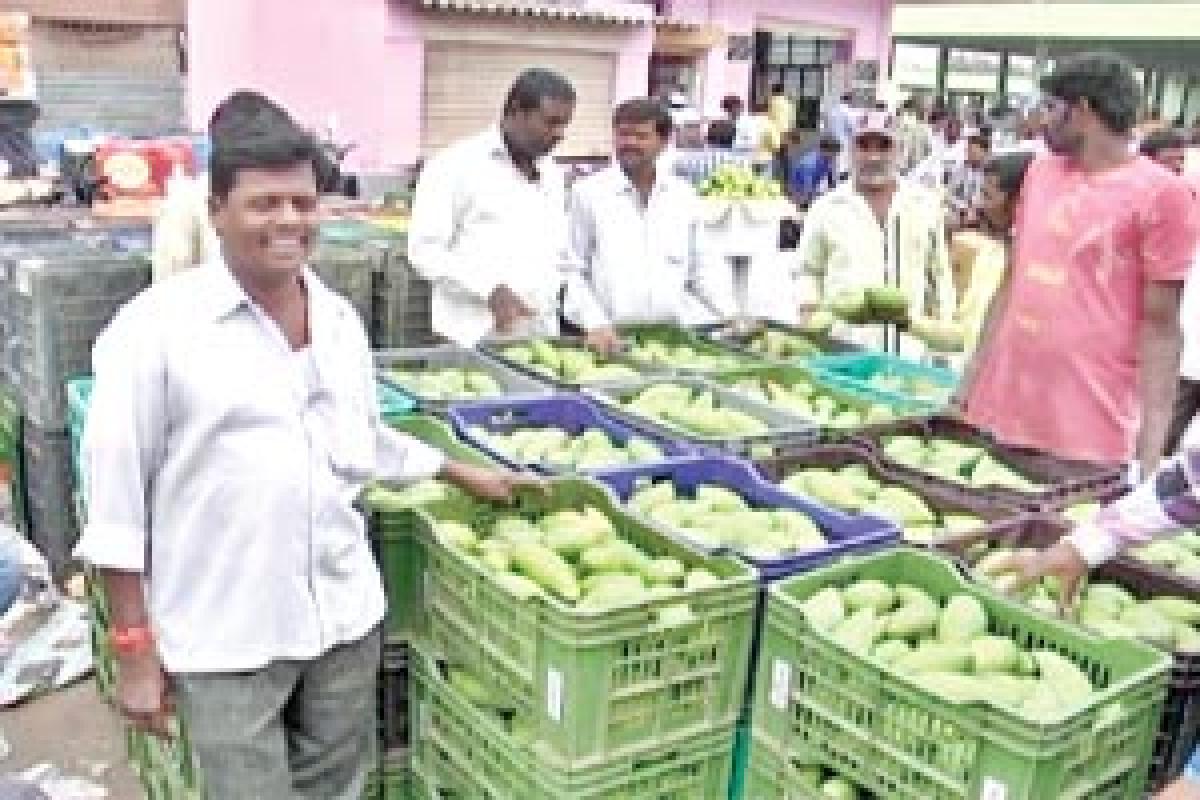Live
- Facial Recognition Attendance Mandatory for Secretariat Employees from Tomorrow
- Upendra’s ‘UI: The Movie’ clears censor; Set for Dec 20 release
- Official: Balakrishna’s ‘Akhanda 2’ locks release date
- Indian Researchers Uncover Key Insights into the Sun's Corona with Aditya-L1
- Brunei sultan urges united efforts from energy companies to face future challenges
- Student Ends Life After Being Scolded by Parents
- Telecom operators geared up to block spammy telemarketer messages from Wednesday
- Mohan Babu should immediately issue a public apology: Press Club President Balavardhan
- Strict Protocols Set for Group 2 Exams in Wanaparthy District
- Delhi Police busts gang involved in cable theft on Delhi Metro Blue Line
Just In

With the arrival of mangoes to Kothapet fruit market here, threat of ripening mangoes with calcium carbide is looming large despite ban on the same.
Traders out to make fast buck on the early yield of mangoes
Hyderabad: With the arrival of mangoes to Kothapet fruit market here, threat of ripening mangoes with calcium carbide is looming large despite ban on the same. With bountiful rains and favourable weather conditions, mangoes, the king among fruits, are likely to flood the market and so is the threat of artificial ripening of the fruits using calcium carbide.
Doubts are being expressed whether the fruits are ripened on the tree or naturally using hay or using the carbide. Ripening the mango on the tree would take at least three months. Moreover, transporting the ripened fruits is difficult. Therefore, traders while transporting the green mangoes in plastic crates keep carbide sachets (100 grams) among them to ripen them chemically in a short span of time.
The sachets absorb the moisture in the surrounding atmosphere and release heat and acetylene gas which aids the process of ripening. Prior to the ban on calcium carbide-aided ripening of mangoes, the traders used to ripen the mangoes openly in the markets by placing the carbide sachets among the mangoes. Following the ban, they took on hire old buildings like abandoned factories and homes in the Old City and ripening the mangoes artificially.
The best way of ripening the fruit is by using the hay. It will take at least seven to 10 days to ripen the fruit. In this process ethylene gas is released and aids the fruit ripening. Fruits ripened in this process are good to savour. Doctors have been cautioning the people against the tricks adopted by the unscrupulous traders, who despite the ban, are ripening the fruit chemically and it could lead to health hazards, including cancer.
During the last season, a kilo of mangoes was sold between Rs 70 and Rs 90. Unlike the earlier times, during the current season the fruit will be sold between Rs 40 and 45 a kilo. According to Kothapet fruit market official Lakshminarayana, during the last season 9.65-lakh tonnes of mangoes were brought to the market. Mangoes were sold at a price of Rs 30,000 to Rs 35,000 a tonne. On favourable monsoon conditions, the mango crop prospects are good and the yield would be very high, he predicted.
He warned of initiating stern action against anyone found using calcium carbide to ripen the fruits and threatened to cancel their licences. Inspections would be conducted frequently to prevent the ripening of the fruit using the carbides. Expecting bountiful crops, glut in the market would crash prices of the fruit. Therefore, farmers are keen on bringing the mangoes quite early.
Chances are that they use the carbide to ripen the fruits to earn early bird incentives. Under such a scenario, there is every need for officials to keep a hawkeye on the application of the carbides by unscrupulous traders and farmers. Further, there is a need on the part of the state government to sensitise people on ill-effects of eating fruits artificially ripened using the carbides.
By Veggalam Ramu

© 2024 Hyderabad Media House Limited/The Hans India. All rights reserved. Powered by hocalwire.com







